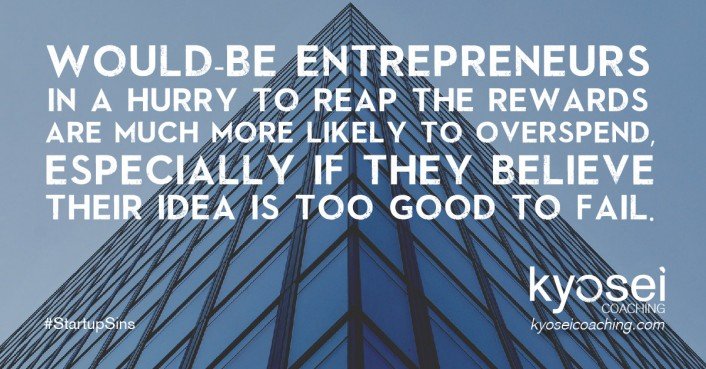Startup Entrepreneurs Risk Overspending
Many of the deadly sins we examine in this series are intimately linked. That’s what makes them so dangerous: they feed off each other and multiply to eat away at the foundations of your fledgling business.
We introduce extravagance here because the previously mentioned sin, impatience, and the upcoming one, arrogance, fuel extravagant spending. Would-be entrepreneurs in a hurry to reap the rewards are much more likely to overspend — especially when they believe their ideas are too good to fail.
It should be pretty self-explanatory why spending too much money can threaten your new business: you’re going to run out of money — fast. There are, however, more subtle reasons, why you should evaluate your relationship with money in the early stages of a start-up.
Smart entrepreneurs have a diverse toolkit for problem solving. Money is one of the tools, and definitely an important one, but it is just one tool of many. Savvy entrepreneurs get in the habit of thinking through a variety of alternatives to managing their way around problems. They know that money is just one solution and understand that it isn’t always the best solution, even if they have lots of it rolling in.
Extravagant entrepreneurs, on the other hand, tend not to be very imaginative. They have a one-size-fits-all solution: money. They believe that if they throw money at problems, then other people, products or services can fix these problems — and fix them fast. This might look like:
- Hiring someone before the business has the cash flow to support it.
- Spending more money than is appropriate for the stage, type and size of the business.
- Getting a fancy office space to help you look successful and established long before you have the cash flow — or clientele — to justify it.
If you have deep pockets, this “go big or go home” approach to starting a business can work — for a while. But even the deepest pockets aren’t bottomless, and a new business with high capital outlay is one of the biggest holes we can think of.
Many entrepreneurs may think that they’re being frugal; however, we’ve found that most new entrepreneurs dramatically underestimate the amount of time (and money) it is going to take for their business to begin turning a profit. No matter how great an initial business concept is, it usually requires several rounds of fine-tuning after initial market testing, which takes time and costs even more money, before you’re on the road to sustainable success.
It is wise to hold off on the big marketing spend until you are absolutely confident in your business concept and revenue model, have clearly defined your target markets, have outlined your marketing strategies, and have set aside the time and money to keep at it for at least a year (or longer) without needing it to be your livelihood. The amount of money this might cost is potentially much less if you’re willing to be frugal about it and seek out ways to get exposure and perform your service without massive spends — but don’t expect to do everything yourself (more on this next week).
You’ll also find that when you spend time working on a business plan, you’ll think up ways to get where you need to go without spending as much money. A smart entrepreneur will consider both her monetary needs and her time, then plan how the two will work together.
Perhaps you already know well the dangers of overspending as an extravagant entrepreneur. Check back soon for our next article, which explores how underspending could hold your company back.



